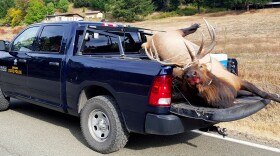Today, a statewide anti-poaching campaign kicks off. It’s to educate the public about recognizing poaching and reporting incidents to authorities.
ProtectOregonsWildlife.com lays out the problem for online users. Incidents range from shooting game animals out of season or within city limits, to the illegal harvesting of sturgeon eggs, which are then peddled as caviar on the black market.
Yvonne Shaw is the anti-poaching campaign coordinator for the Oregon Department of Fish and Wildlife. She told KLCC it’s a huge issue that challenges efforts to reign it in.
“Last year we had at least 5,000 animals that were illegally killed. Fish and wildlife. And OSP Fish and Wildlife troopers only find a fraction of these crimes that occur. These are crimes with voiceless victims.”
Many cases take place in isolated, rural settings or behind closed doors. And some happen online, such as the unregulated sale of exotic turtles and fish as pets.
And in some instances, poaching severely hurts efforts to help struggling species.

Shaw said last year, officials found over a thousand salmon had been illegally taken from state waterways.
“Oftentimes this is people taking two fish instead of one, if one is the limit, they may be go over their limit,” explained Shaw. “They may be snagging fish, which means they put a hook in the water and then just yank it back instead of legally hooking them in the mouth, which damages the fish.
“Salmon are challenged in many ways in the world today. We don’t need to add poaching to be one of that ways.”
Many Native American tribes have worked to restore dwindling salmon populations across the Pacific Northwest, which have been severely affected by development, pollution, invasive bass, and climate change.
Conservation and recreation groups have also decried poaching of wildlife. Many hunters and anglers say it puts their groups in a negative light and also hurts game or their habitat. In the case of poaching from vehicles, stray bullets or decomposing carcasses also pose a threat to public safety.
While many cases of poaching involve shooting animals for the adrenaline rush, others are for profit. Bear parts – from claws to the head to even gall bladders – are sold for hefty prices. And those who poach sturgeon for their eggs are often killing ones that are 80 to 100 years old.

Shaw says a survey of over 800 Oregonians showed that 83% said poaching for “thrill kills” was worse than poaching for food. And 79% felt future generations of state residents will be affected by poaching.
The ODFW offers a “hunter preference points” while the Oregon Hunters Association offers cash rewards for turning in poachers. People are urged to report poaching at 800-452-7888 or online at ProtectOregonsWildlife.com.











